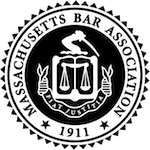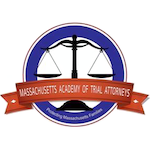Nursing homes are entrusted with the care of our elderly loved ones, ensuring they receive the respect, attention, and medical care they deserve. Unfortunately, when this trust is broken—whether through neglect, oversight, or deliberate harm—the consequences can be devastating.
If you suspect that a loved one has been mistreated in a Cambridge nursing home, you may be entitled to seek justice and compensation. Our legal team at Larson Law in Cambridge is here to help. We understand the complexities of nursing home abuse cases and have the experience needed to hold negligent parties accountable.
Contact us at (617) 932-6169 to schedule a free consultation with our compassionate and skilled Cambridge nursing home abuse attorney. We’ll listen to your concerns, evaluate your case, and guide you through the steps needed to protect your loved one’s rights and secure the compensation they deserve.
HOW CAN OUR ELDER INJURY ATTORNEYS IN CAMBRIDGE ASSIST WITH YOUR CASE?

We have extensive experience handling cases of elder abuse and neglect, and we are committed to fighting for the rights of seniors. Our team will conduct a thorough investigation, gather evidence, and work tirelessly to build a strong case on your behalf. We understand the emotional and financial toll that elder abuse can take, and we are dedicated to securing the compensation you deserve to cover medical expenses, pain and suffering, and other related costs.
Don’t let elder abuse go unchecked. Contact our Cambridge elder injury lawyers at Larson Law today for a free consultation. Call (617) 932-6169 to discuss your case and learn how we can help you seek justice.
HOW COMMON IS CAMBRIDGE NURSING HOME ABUSE?
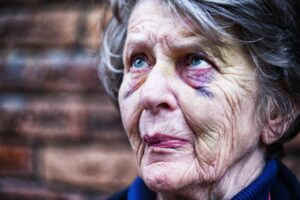
The data suggests that the risk of nursing home abuse or neglect in Cambridge might be more prevalent than one might expect. Families must remain alert to any signs of mistreatment and take immediate steps if they suspect their loved ones are not receiving the care they deserve. Protecting the well-being of residents and holding negligent facilities accountable is essential.
COMMON TYPES OF NURSING HOME ABUSE THAT OCCURRED IN CAMBRIDGE, MA

- Physical Abuse: This involves the use of physical force that results in pain, injury, or distress. It includes actions like hitting, shoving, or improperly restraining residents, often leading to broken bones, bruises, or other severe injuries.
- Sexual Abuse: Any non-consensual sexual interaction, including unwanted touching or assault, is a deeply traumatic violation. Elderly residents, who may be unable to defend themselves, are particularly vulnerable to this form of abuse.
- Emotional and Psychological Abuse: This includes verbal assaults, threats, humiliation, and isolation. These actions can cause severe mental anguish, leading to depression, anxiety, and a sense of helplessness among residents.
- Financial Exploitation: This occurs when a resident’s finances or property are misused or stolen, often leaving them in a vulnerable financial position. This type of abuse can involve unauthorized withdrawals, changes to wills, or exploitation of a resident’s assets.
- Neglect: Failing to provide necessary care, such as proper nutrition, hydration, medical attention, or hygiene, constitutes neglect. This form of abuse can lead to worsening health conditions, infections, and even death.
- Medical Negligence: When nursing home staff fail to provide adequate medical care, such as not diagnosing or treating illnesses on time, it can result in severe injury or death. This negligence is a critical issue in ensuring the safety of nursing home residents.
- Abandonment and Isolation: This involves deliberately leaving residents unattended or isolating them from social interactions, depriving them of essential care and companionship. This form of abuse can lead to feelings of abandonment, loneliness, and severe mental health issues.
Understanding these common forms of abuse can help protect nursing home residents and ensure they receive the care and dignity they deserve. If you suspect a loved one is experiencing any form of abuse in a Cambridge nursing home, contact us today for a free consultation with our experienced nursing home abuse attorney in Cambridge to fight your rights and discuss your case.
WARNING SIGNS THAT THE VICTIM IN CAMBRIDGE IS BEING ABUSE
Abuse in nursing homes is not always easy to spot, but there are subtle warning signs that may indicate a resident is being mistreated. If you notice any of these signs in a loved one, it is important to take action immediately to protect their well-being.
- Unexplained Weight Changes: Significant fluctuations in weight, either gain or loss, can be a red flag. This might suggest neglect in providing proper nutrition or, conversely, the misuse of medications that affect appetite.
- Frequent Sedation: If a resident seems unusually drowsy or is consistently sedated, it could indicate the improper or excessive use of medication to control behavior, rather than addressing their needs with proper care.
- Sudden Illnesses: Unexplained or sudden onset of illnesses may point to neglect or improper medical care. This could include untreated infections, bedsores, or other preventable conditions that arise from poor hygiene or neglect.
Depression: A noticeable shift in mood, such as persistent sadness or despair, can be a sign of emotional or psychological abuse. This may result from verbal abuse, isolation, or being subjected to an uncaring environment.
- Emotional Withdrawal: If a resident suddenly becomes withdrawn or unresponsive, it may indicate they are experiencing abuse or neglect. This could manifest as a reluctance to speak, avoiding eye contact, or a general lack of engagement with others.
WHAT QUALIFIES AS NURSING HOME ABUSE AND NEGLECT IN CAMBRIDGE, MA?
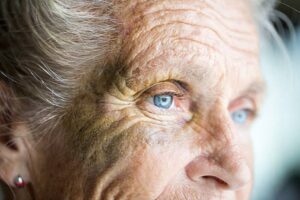
- Inadequate Medical Care: Failure to properly diagnose and treat medical conditions in a timely manner can result in preventable suffering. This includes not recognizing symptoms that require immediate attention, leading to worsening health issues.
- Medication Errors: These occur when residents receive incorrect dosages, are overmedicated or undermedicated, or are given the wrong medication entirely. Such errors can cause serious health complications or even fatalities.
- Preventable Falls: When a nursing home fails to provide a safe environment, residents may experience falls that lead to multiple fractures, traumatic brain injuries, or death. Proper supervision and safety measures are critical to preventing such incidents.
- Bedsores (Pressure Ulcers): Bedsores are painful wounds that develop due to prolonged pressure on the skin, often from being bedridden. These sores can become serious if not promptly diagnosed and treated, leading to infections and other complications.
- Lack of Supervision: Insufficient supervision can result in residents wandering off the premises or becoming lost, exposing them to injury or danger. Proper monitoring is essential to ensure residents’ safety.
- Elder Abuse: This can manifest as physical, emotional, or sexual abuse, often due to inadequate screening, poor training, or improper staff-to-patient ratios. Neglecting a resident’s basic needs or inflicting harm, whether intentionally or through oversight, is a clear sign of abuse.
If you suspect that a loved one is experiencing any of these forms of abuse or neglect in a Cambridge nursing home, it is important to seek legal assistance immediately. Our experienced Cambridge nursing home injury attorney can help hold the responsible parties accountable and ensure that the affected resident receives the care and justice they deserve. Call us today and schedule your free consultation.
WE HOLD ALL THOSE RESPONSIBLE FOR CAMBRIDGE NURSING HOME ABUSE ACCOUNTABLE
In Cambridge, MA, nursing home abuse is a serious issue, and those responsible must be held accountable for their actions or negligence. At our firm, we are committed to seeking justice for victims by pursuing all liable parties. Here are the individuals and groups we hold accountable in cases of nursing home abuse:
- Nursing Home Staff: Caregivers, nurses, and other staff members who directly interact with residents are often the first line of responsibility. If they engage in or overlook abusive behavior, they can be held legally responsible.
- Management and Employees: Beyond frontline staff, those in managerial positions and other employees who fail to implement proper training, supervision, and safety protocols can also be held liable for creating an environment where abuse can occur.
- Family Members: Sometimes, visiting family members may contribute to the abuse or neglect of a resident. In such cases, we ensure that these individuals are also held accountable for their harmful actions.
- Visitors: Abuse isn’t limited to those directly connected to the nursing home. Visitors, including friends and acquaintances of residents, may also be responsible for the abuse, and we work to hold them accountable for any wrongdoing.
- Other Residents: Abuse can also occur between residents, with some individuals targeting their peers. In these situations, we take appropriate legal action to address the harm caused and prevent further abuse.
At Larson Law, we are dedicated to pursuing justice for those affected by nursing home abuse in Cambridge. We take a comprehensive approach to ensure that everyone responsible is held accountable, no matter their role. If you suspect nursing home abuse, contact our nursing home abuse and neglect lawyer in Cambridge to discuss how we can help you protect your loved ones and seek the justice they deserve.
HOW TO REPORT NURSING HOME ABUSE AND NEGLECT IN CAMBRIDGE, MA

Federal Government Agencies:
- Administration for Community Living (ACL): The ACL works to support older adults and individuals with disabilities, providing resources and advocacy.
- Centers for Medicare & Medicaid Services (CMS): CMS oversees nursing homes that receive federal funding, ensuring they comply with health and safety standards.
- Department of Justice (DOJ): The DOJ enforces laws that protect nursing home residents from abuse and neglect, including elder abuse laws.
Massachusetts State Agencies:
- Executive Office of Elder Affairs (EOEA): EOEA oversees the well-being of older adults in Massachusetts, including ensuring proper care in nursing homes.
- The Attorney General’s Office: The Massachusetts Attorney General’s Office handles cases of elder abuse, including criminal investigations and legal action against responsible parties.
- Department of Public Health (DPH): DPH monitors the quality of care in nursing homes and can investigate reports of abuse and neglect.
Non-Governmental Organizations:
- National Center on Elder Abuse (NCEA): NCEA offers resources and guidance on how to report and prevent elder abuse.
- Eldercare Locator: This service connects individuals with local resources and assistance for elder care, including reporting abuse.
Taking action to report suspected abuse is a critical step in protecting nursing home residents in Cambridge. By contacting the appropriate agencies, you can help ensure that those responsible are held accountable and that vulnerable individuals receive the care they deserve. If you need further guidance or legal assistance, our nursing home injury lawyer in Cambridge is here to support you through the process.
SCHEDULE US NOW FOR CONSULTATION WITH OUR CAMBRIDGE NURSING HOME ABUSE ATTORNEY
At Larson Law in Cambridge, we offer a complimentary consultation to discuss your case and address any questions you might have about nursing home abuse. Reach out to us today at (617) 932-6169 to schedule your free case evaluation with our experienced nursing home abuse lawyer in Cambridge. Let us help you understand your rights and explore your legal options.
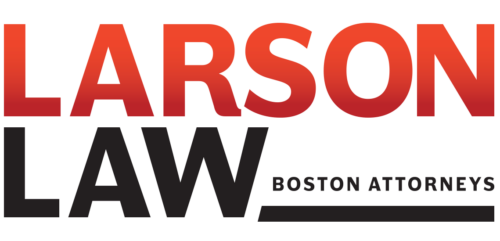
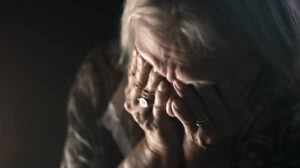 Depression:
Depression:
